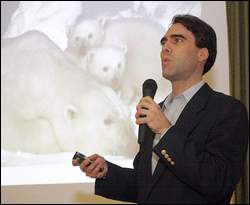PORTSMOUTH — Adventurer, activist and author Chad Kister was just 21
years old in 1991 during his first solo adventure into the Arctic.
Since then, he has been back three times, most recently in 2005, and the changes he has seen have been dramatic.
Kister
shared his experiences, his fears and his hopes with a group of about
45 people at the St. John's Episcopal Church Parish Hall on Friday
night as part of his Polar Bear Survival Tour.
Having
witnessed first-hand the negative impacts of oil drilling and climate
change in the fragile region, Kister is able to bring the experience to
people all around the country through his slideshows, stories and
videos.
"Once I saw the land and stayed with the native peoples
I realized the importance of this issue," Kister said. "It was a great
adventure with a deep purpose behind it."
Using stunning photos
and first-hand accounts, Kister described how oil companies have
devastated the ecology of the region, and how future development, along
with climate change is threatening to kill off many species, including
polar bears, walruses, and many birds and fish.
An avid
fishermen, when Kister embarked on his first 90-day journey he brought
only 10 days worth of food, expecting he would easily be able to catch
fish throughout his journey. He started in Prudhoe Bay, where automatic
oil pumping stations had leaked toxic waste into the surrounding
waterways killing off fish populations and Kister was forced to find
edible plants for survival.
Central Arctic caribou herds have
been massively displaced by development around Prudhoe Bay also and are
so toxic, that native people will no longer eat them, Kister said.
The
Arctic National Wildlife Refuge is one of the only places left on earth
with all of its original inhabitants, including muskox, caribou, a wide
range of birds and fish and of course, polar bears.
Proposed oil
development is right on top of the muskox range and would leave a
permanent destruction of the habitat, Kister said. In addition, oil
companies routinely crush polar bear dens, who are suffering in many
other ways and are expected to be added to the endangered species list
any day. As the Arctic ice rapidly melts, polar bears continue to lose
their habitat and toxic waste in the drinking water is killing them as
well.
Walruses may also soon be added to the list, as the pack ice they rely on quickly recedes.
Salmon
breeding grounds are threatened as water temperatures rise, Arctic Char
are threatened by proposed oil development which would bisect the
rivers in which they thrive, caribou are losing land and the list goes
on.
"This is not a secure way to get energy," Kister said about drilling in the Arctic Wildlife Refuge.
But
the oil companies keep trying, despite the fact that it would only
affect the price at the pump by about one cent, Kister said.
And
what happens to the Arctic affects us all, he said, adding that as the
ice melts, more of the sun's heat is absorbed into the earth instead of
being reflected back. As permafrost melts, fossil fuels escape into the
atmosphere, including carbon dioxide and methane.
"There really is no question anymore that we are the ones causing these crises," Kister said.
A 2004 Pentagon report called climate change a more serious problem than terrorism.
Current
estimates by NASA scientists are for an ice-free Arctic Ocean as early
as 2012, something the planet has not seen for a million years.
Kister
said one of the scariest things he hears as he travels around the
country, generally by train or bus, is that people think it is too late
to do anything about the situation.
He offered simple solutions
for people to take action into their own hands, including using more
energy efficient light bulbs, using more mass transit, weatherizing
homes and writing constant letters to senators and representatives.
Kister
also recommended boycotting Shell Oil, which recently purchased a lease
in the Western Arctic that would destroy prime polar bear habitat.
The
Polar Bear Survival Tour was presented by the St. John's Stewardship of
the Earth Committee as part of its Down to Earth Series, which has
offered forums and multimedia presentations on the environment, with a
specific focus on the problem of climate change.
The series aims
to educate Seacoast residents about their connection to the natural
world and encourage action, both political and personal, to reduce
carbon emissions and other types of pollution.

|

